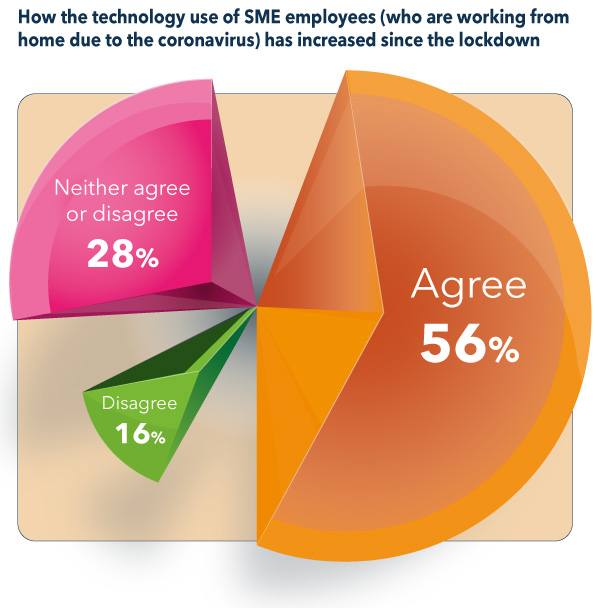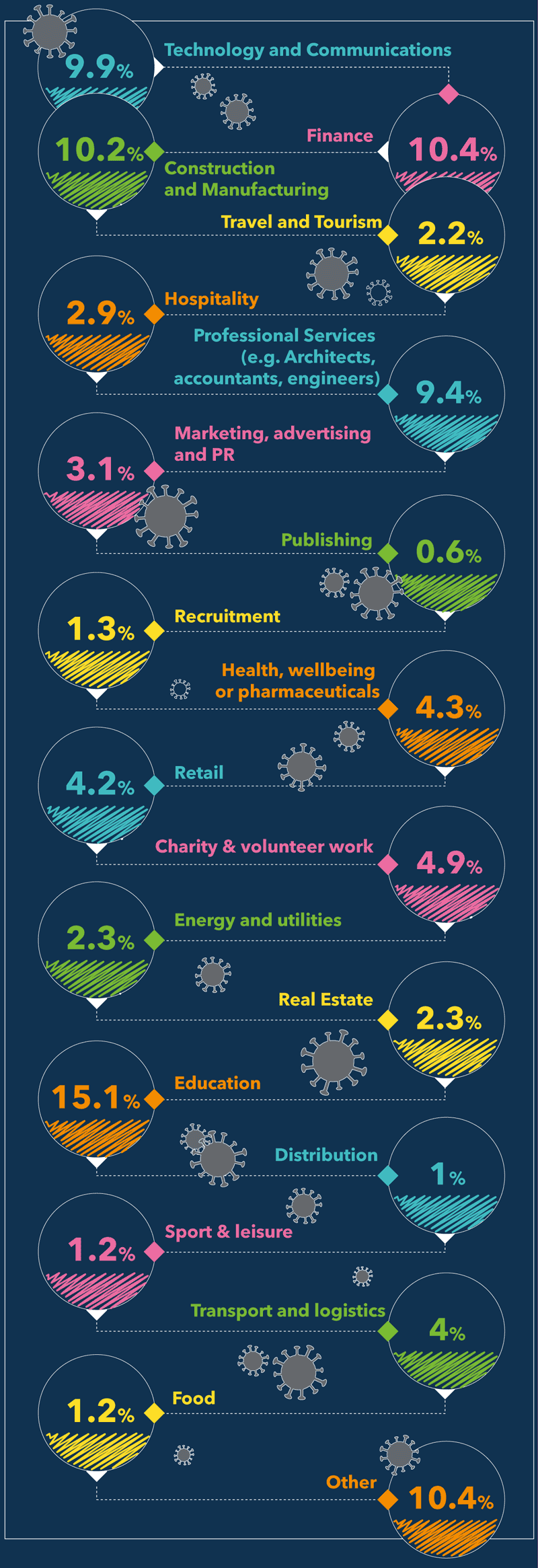Should SMEs continue to work from home after the lockdown?
COVID-19 is changing not only the way we do business but also where and how we work. Thanks to today’s technology, most businesses have remained operational – and because of the financial and productivity benefits of working from home, many managers are now mulling over whether to continue remote working even after the lockdown has been fully lifted. However, many are still unsure whether the long term benefits outweigh the short term technology and wellbeing challenges.
To help managers navigate remote working for the future, our experts and research partners have collaborated to survey 1,000 workers from small and medium-sized business – all of which have been working from home due to the coronavirus. The in-depth study presented on these tabs explores:
- The long-term challenges and opportunities that SMEs and their workers are facing with the switch to home working
- How the lockdown and social distancing is impacting productivity, communications and use of technology such as business mobiles, business phones and cloud-based telephony platforms.
- The long-term impact of working from home and Covid-19 on managing teams and the industries most impacted by the change
- Advice from our telecoms experts for managers on how to address common technology, communications, organisational and team management challenges in the new age of working from home.
Working from home – The tech challenges facing SMEs
We understand that the coronavirus is still creating significant technological and operational challenges for businesses. Since the lockdown, 86% of the 1,000 SMEs surveyed in this report said they are still grappling with significant communications, team management or technology challenges just to maintain ‘business as usual’. These obstacles range from setting up video conferencing and new business mobile technology to sourcing new software, cybersecurity issues, employee management concerns and team morale.


Facilitating communications
Work from home IT represent 6 of the top 10 challenges that businesses continue to face when thinking about how to work remotely.
- 50% find facilitating group calls or finding the right communications platforms a challenge.
- 23% are having issues receiving or sending emails from home
- 22% have overcome misunderstandings or poor team communication due to reduced face time with colleagues.
23% are getting to grips with the sheer quantity of different communications platforms used across multiple teams and organisations.
Team management issues
Businesses are feeling the impact of home working when it comes to managing teams.
- Headaches related to facilitating group meetings (27%) and managing employees remotely (27%) have been significant- representing the joint-second biggest challenge that SMEs are having to address. Nearly 1 in 5 SMEs have been tested by trying to facilitate communications with clients or suppliers (18%)
- 21% are finding that their ability to life team morale is limited by working from home
However, small businesses have had less trouble than one might predict when it comes to the operations side of their businesses.
Managing employees’ priorities (16%) and time (15%) remotely or having to completely re-engineer tasks to suit home working (14%) has impacted only a relatively small proportion of businesses.
Broadband and hardware challenges
Broadband and hardware issues have also been a barrier to working from home for as many as 1 in 5 small business workers.
Although most UK homes have an internet connection, 21% are having issues with their broadband connection while working remotely.
Some businesses have been struggling to source equipment, with 15% of SME workers agreeing that they have lacked access to hardware (e.g. laptops, phones) to work remotely.
Getting to grips with new software
1 in 5 small businesses (20%) have had challenges sourcing adequate software platforms to facilitate home working. A further 13% are also experiencing issues accessing industry or company-specific software platforms.
Home-based interruptions
This study also found that several SMEs have been challenged by home-based interruptions, with 35% having experienced this since working from home due to the coronavirus.
Concerns with cybersecurity
With increased phishing activity during the lockdown and more potential for security problems when working from home, our study asked small business workers about security challenges since the virus outbreak. Although many companies have updated their cloud technology, 14% of respondents have experienced issues maintaining security since moving to a remote working model.

Generational differences
Managers and workers from different generations are being impacted by the coronavirus crisis in different ways.
- The largest concern for 25-30-year olds has been facilitating group meetings and calls (30%),
- 41-50-year olds have been more challenged by managing employees remotely (30%)
- 51-60-year olds have found making calls and responding to emails their biggest challenge (50%)
These generational differences may be linked to familiarity of technology and how accustomed they are using business mobiles to effortlessly access emails and call colleagues.
 1https://www.the guardian.com/politics/2020/apr/22/welsh-ministers-mic-mistake-broadcasts-sweary-rant-to-assembly
1https://www.the guardian.com/politics/2020/apr/22/welsh-ministers-mic-mistake-broadcasts-sweary-rant-to-assembly
2https://www.bbc.co.uk/news/av/world-52050099/coronavirus-robert-kelly-whose-kids-crashed-bbc-interview-talks-about-working-from-home
Business productivity – The impact of the Coronavirus
At Onecom we understand that small and medium-sized businesses may have mixed views on how to work from home and whether they should continue to do so after lockdown has been fully lifted. Some now see working from home as a model for the future, others are concerned about productivity. To shed some light on this, our study asked 1,000 employees at UK SMEs whether working from home during the lockdown has impacted their productivity and motivation in relation to their work output. It also quizzed these employees about how their use of technology and business mobiles (during work hours) has changed since working from home, compared to earlier in the year.


Productivity of 2 in 3 workers impacted by the coronavirus
67% of UK SME workers feel that their productivity levels have changed since working from home. The good news for business is that the majority, 56%, said that their productivity has either increased (28%) or remained the same (28%) since lockdown.
- 39% said that their productivity has decreased since working from home.
- A similar pattern exists in relation to how motivated workers feel; 54% said that this has increased (25%) or remained the same (29%). 42% claim to be less motivated.
 4 in 5 workers using business mobiles and technology more often
4 in 5 workers using business mobiles and technology more often
Another positive is that technology and business phone usage is on the rise. 83% of SME workers claim that the time spent on their phone and using technology has increased. The infographic to the right illustrates how SME workers’ technology and mobile phone for business use has changed. It also shows that the rise in technology use for both work-related and personal reasons has been broadly similar.

COVID-19 is changing the way SMEs manage teams and do business
From elbow bumps to video meetings, the coronavirus is changing how businesses operate. However, the move to working from home is also having a significant impact on how employers can do business and utilise the skillsets of teams. Many departments live or die by their ability to collaborate, persuade, sell, work together, and solve complicated problems. With that in mind, Onecom’s study of 1,000 SME workers also explored how working from home is changing the way managers look after their teams and do business.


Communications – frequency and errors are on the rise
Good teamwork is essential, with poor communications costing the average UK business around £8k per employee every year1.
According to our business survey, the switch to remote working appears to be having a mixed influence on workers’ actions in this area – with both messaging frequency and the number of communications errors on the rise.
- 58%of SME workers are communicating and collaborating with each other at either an increased frequency or the same rate as they were previously. With the move to working from home and a reduced number of face-to-face meetings taking place, many employees appear to be making the effort to work together on projects and reach out to their colleagues and business partners more often.
- 29% are using communications and messaging platforms such as Slack more often
- 37%are communicating with others less often. Mental wellbeing is a key concern during the lockdown, highlighting the need for managers to ensure that they encourage their teams to communicate regularly.31% admit to having experienced more communications errors since As 93% of communication is non-verbal2, it is vital that teams limit the opportunity for messages to get lost in translation by making use of mobile applications and the plethora of communications platforms available.
3 in 5 managers feel confident about organising teams remotely
Managing a team remotely is no mean feat and the good news for managers is that most appear to be coping quite well with this.
- The study found that 59% feel equally or more able to manage reports and colleague relationships since the lockdown
- 29% feel less able to manage employees with reduced face time. A common issue that team leaders grapple with when managing reports remotely is feeling that they lack face-to-face time with the team and visibility over their work.
Is the pandemic enhancing problem-solving skills?
Many small businesses are no stranger to a challenge and their ability to tackle these may actually be enhanced by working from home.
73% of SME workers in the poll found that their ability to solve complex problems has remained the same or improved since the lockdown. For some, this may be down to fewer work-related distractions or even because they have recently exercised those problem-solving skills in managing the impact of COVID-19 on their business.
SMEs have been negotiating harder
Whether it’s clinching a new business deal, recruiting an industry star or negotiating down a supplier, persuasion is an essential business skill. Our survey suggests that the economic impact of the lockdown and social distancing measures may be encouraging workers to drive a harder bargain.
- 66% said that their ability to successfully negotiate in business has remained the same or improved – compared to just 23% who felt the inverse.



Which businesses are working from home?
Thousands of businesses have been kept operational throughout the coronavirus crisis due to the wide range of innovative communications solutions available. However, the extent to which businesses can facilitate home working also depends on the industry in which they operate and whether jobs need to be done ‘on location’. Of the 1,000 small and medium-sized business workers who met the criteria of working from home during the coronavirus, only 4% work in transport/logistics and 1.2% in food.
The infographic illustrates the split of small and medium-sized businesses working from home since lockdown across different industries.



Ask the experts — How to make remote working work for you
Our poll of 1,000 SMEs employees shines a light on the myriad of technological, communications and operational challenges facing managers due to the coronavirus crisis.


 The good news is that many businesses have already overcome significant obstacles. However, as the world continues to change dramatically, many businesses are now pondering how to successfully work remotely for the long term and are looking for a helping hand when it comes to challenges such as:
The good news is that many businesses have already overcome significant obstacles. However, as the world continues to change dramatically, many businesses are now pondering how to successfully work remotely for the long term and are looking for a helping hand when it comes to challenges such as:
- Facilitating good communications and resolving messaging errors
- Getting to grips with different communications and software platforms
- Technology solutions to working from home
- Improving workforce productivity
- Managing and organising teams effectively
With this in mind, our telecommunications and technology experts collaborated to help businesses navigate the foreseeable future and understand the best ways to work from home. Businesses looking for work from home ideas, information on how to set up their teams’ living rooms to do online work from home or even those just looking for home business ideas can use this checklist (below) to decide on the right technology and systems to put in place to work from home productively. Since the government announced the lockdown, we have helped over 3,500 workers across the country set up with the right solutions to get them up and running.
- Branch out from email. Enable those valuable office-based conversations to continue in the virtual world with instant messaging applications such as Slack
- Body language and tone of voice make up 93% of all communication1, so invest in audio and video conferencing platforms. From Go To Meeting to Zoom – consider the right software for your team and encourage them to use it. Ideally agree on one organisation-wide channel for communications to avoid creating confusion
- Consider business phone contracts for your team – especially if your team needs to receive or make external calls as a key function of their work. Collaborate with your telecommunications provider to integrate their business mobiles into your mainline phone system




